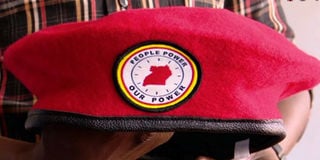Government bans media houses from hosting politicians donning red berets

The red berets which have for a while been synonymous with presidential aspirant, Robert Kyagulanyi's people power movement, were in September 2019 gazetted as attire for the army.
The government has banned media houses from hosting politicians wearing the red beret, which was gazetted as attire for the army.
While addressing media owmers, government spokesperson, Mr Ofwono Opondo warned that those who insist on hosting these individuals, will be breaching the regulation and will be arrested going forward.
“Anyone who wanted to stop the process would have sought a court injunction. But since no one has not gone to court, it is illegal to use the beret. Those who are found culpable will be arrested,” Mr Opondo said.
This was during an engagement between media owners and security agencies at the Chieftaincy of Military Intelligence offices on Tuesday.
In the same meeting, the media owners under their umbrella body, the National Association for Broadcasters (NAB), petitioned security agencies over the arrest and brutality meted out to journalists and panelists.
In their petition, the media owners said the most fundamental principle defining credible elections entails the expression of the people, transparency, and inclusiveness.
Their key points in the petition include respect and protection of members of the fourth estate and according them support when executing their duties, refraining from arresting guests of media houses at their premises before, during and after talk shows, and according safe passage to those moving after curfew hours.
They urged the security agencies to: “Respect and stop interfering with our programmes and desist from issuing unnecessary threats to media houses. In cases you believe, some of the programmes breach any regulations, the issue should be followed up with the relevant regulators and continue to support media houses and our journalists to operate 24/7 during curfew, election period and even after.”
The Internal Affairs minister, Gen Jeje Odongo, who chaired the meeting, said they had reached a compromise to come up with a committee to monitor the safety of journalists and receive all complaints in that regard.
“It is unfortunate that these issues have been happening and we have heard them. The security is committed to protecting journalists while in line of duty. We have come up with a committee that will handle the matters during the election period,” Gen Odongo said.
According to the different leaders, the 10-member committee will be chaired by Mr Ofwono, a representative from Uganda Communication Commission, Electoral Commission, and three members from NAB.
The other four members will be from the security agencies, including, Internal Security Organisation, External Security Organsation, Chieftaincy for Military Intelligence as well as Uganda Police Force.
The security in the recent past has been in the spotlight for arresting, brutalising and confiscating equipment of journalists while in the field.

This file photo taken in May 2013 shows Policemen arresting a journalist in Kampala. Human Rights Network for Journalists and local journalists had organised a demonstration protesting the closure of the Daily Monitor and Red Pepper newspapers, a move perceived by experts as a violation of human rights. PHOTO/FILE/MORGAN MBABAZI.
Mr Kin Kariisa, the chairman NAB, said their agreement with security was to see that these incidents do not resurface.
“These issues have been happening but now we have reassurance and we hope that what has been agreed upon will be adhered to. We want our journalists to be secure during their work,” Mr Kariisa said.
Incidents
In 2018, NTV journalists, Herbert Zziwa and Ronald Muwanga were arrested and their equipment confiscated while they covered the Arua Municipality by-elections. They were released on police bond after spending a night in police custody.
In August 2018, Reuters journalist James Akena was battered in Kampala while covering the Free Bobi protests. Three years later, the journalist moves in a wheel chair as he was disabled by the security.




